
Modern workflow management goes beyond to-do lists – it’s about using intelligent systems that adapt, make decisions, and automate work. AI Agent Platforms enable teams to streamline tasks, reduce errors, and speed up operations across departments. These platforms analyze data, automate responses, and integrate with CRMs, communication tools, and analytics platforms. Their flexibility makes them ideal for fast-paced, tech-driven teams. In this guide, we review five top AI Agent Platforms that help teams improve productivity and stay agile in today’s dynamic business environment.
TL;DR – Best AI Agent Platforms for Workflow Management
1. FuseBase – Best for AI-driven task orchestration with client collaboration
All-in-one platform combining document analysis, end-to-end automation, AI Agents, and branded portals to manage internal and external workflows.
2. Relay – Best for adaptive workflows with real-time content generation
LLM-powered automations that retain context between steps, ideal for marketing, support, and fast-moving content ops.
3. Levity – Best for no-code classification of complex, unstructured inputs
No-code AI models to classify, tag, and triage emails, PDFs, images, and forms with confidence-based routing.
4. Relevance AI – Best for building custom AI pipelines and internal intelligence
Drag-and-drop pipelines combining retrieval, generation, and classification for data analysis, dashboards, and knowledge automation.
5. CrewAI – Best for experimenting with collaborative, role-based AI agents
Open-source framework to orchestrate multiple agents with memory and defined responsibilities for advanced workflows.
What Is an AI Agent Platform?
For teams focused on smarter workflow management, an AI Agent Platform provides a central layer of intelligence that connects tools, tasks, and decisions. These platforms function as orchestrators – tracking progress, triggering updates, and dynamically adjusting based on inputs or delays. Unlike basic project tools, AI Agent Platforms can learn from behavior, react to real-time changes, and assist across functions like sales, support, and operations. They help teams stay on track, align better across roles, and reduce the need for manual coordination through intelligent automation.
Core Benefits of AI Agent Platforms
AI Agent Platforms are transforming how modern teams manage workflows – moving beyond basic task management to deliver intelligent, autonomous coordination across departments. These platforms aren’t just about automation. They’re about working smarter, staying aligned, and scaling operations without added complexity. Here’s a closer look at their key advantages:
- Streamlined, Multi-Step Workflows: AI agents automate complex workflows involving multiple steps, teams, and systems – from lead qualification to internal approvals and task assignments. This reduces the need for constant back-and-forth and ensures processes move forward without delay.
- Dynamic Adaptability in Real Time: Unlike rigid rule-based systems, AI Agent Platforms can respond to changing inputs, conditions, or deadlines. Agents can reroute tasks, adjust timing, or update priorities on the fly – keeping workflows fluid and responsive.
- Cross-Tool and Cross-Team Integration: These platforms connect with your existing tools – CRMs, ticketing systems, project management apps – enabling seamless task flow across departments like operations, marketing, customer support, and HR.
- Improved Visibility and Accountability: With centralized dashboards and intelligent tracking, AI agents give managers real-time insights into progress, ownership, and bottlenecks. Everyone knows what’s happening, when, and who’s responsible.
- Reduced Manual Coordination: Agents automatically trigger next steps, send follow-ups, notify stakeholders, and escalate issues when needed – reducing the need for status check-ins and freeing up teams for more strategic work.
- Scalable and Customizable Logic: Whether you’re managing a small team or a global operation, AI Agent Platforms can scale with your needs. You can build conditional logic, assign role-based permissions, and create process variations without needing to code.
- Smarter Decision-Making Built In: Some platforms include AI reasoning or decision trees that evaluate data in real-time – enabling agents to make context-aware decisions, suggest optimizations, or flag anomalies automatically.
By centralizing process intelligence and automating coordination, AI Agent Platforms help teams operate with greater speed, accuracy, and alignment. They’re the backbone of scalable, efficient workflow management – and a competitive advantage for any forward-thinking organization.
Top 5 AI Agent Platforms in 2025
Traditional workflow tools automate tasks – but modern AI Agent Platforms go a step further. These platforms combine AI reasoning, real-time decision-making, and multi-step automation to streamline complex processes, improve visibility, and reduce the need for manual oversight.
1. FuseBase (Best AI Agent Platform for End-to-End Workflow Management)
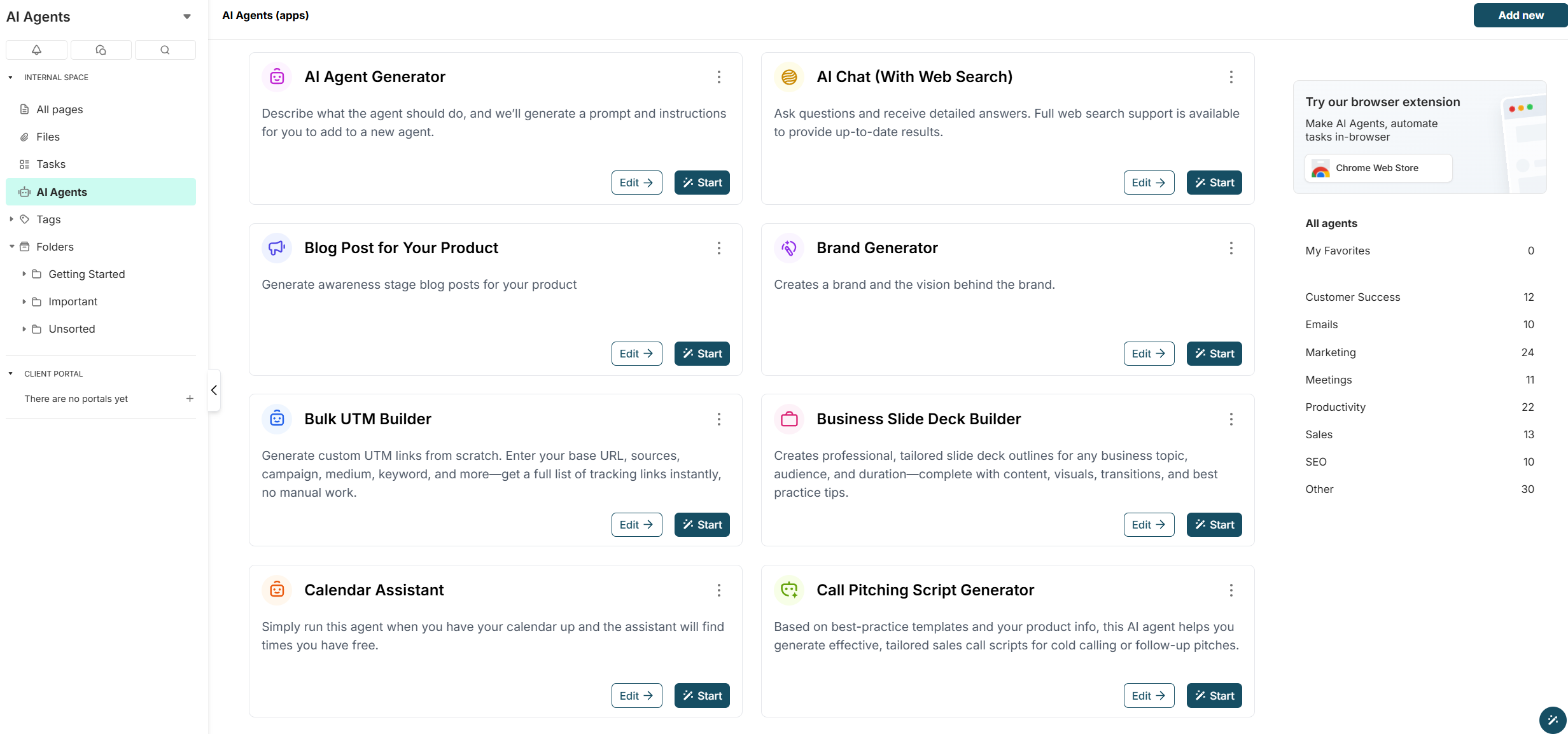
FuseBase is a powerful all-in-one AI Agent Platform designed for teams that manage both internal operations and client-facing processes. It combines a no-code visual builder, prompt-based AI automation, form logic, and branded client portals– making it an ideal choice for service teams, agencies, and operations leads. FuseBase agents can analyze documents, handle form submissions, execute multi-step flows, and generate structured outputs using natural language prompts.
With FuseBase, you can automate task sequences, delegate follow-ups, trigger smart document generation, and route tasks based on form inputs or user roles. Its native AI Assistant supports contextual understanding, helping teams automate without complexity. Unlike basic workflow tools, FuseBase offers a seamless bridge between internal coordination and external delivery – all while maintaining full control over permissions, branding, and content.
Advantages:
- Unified platform for task automation, content workflows, and client interaction.
- AI-powered agents for document analysis, generation, and decision-making.
- Branded portals for client approvals, collaboration, and content delivery.
- Role-based task routing, conditional logic, and progress tracking.
- Visual workflow builder with integrated AI actions and smart triggers.
- Connects with Google Drive, Notion, Slack, Gmail, and more.
🚀 Example of how AI Agents transform your work:
2. Relay (Best for Real-Time AI-Driven Team Automation)
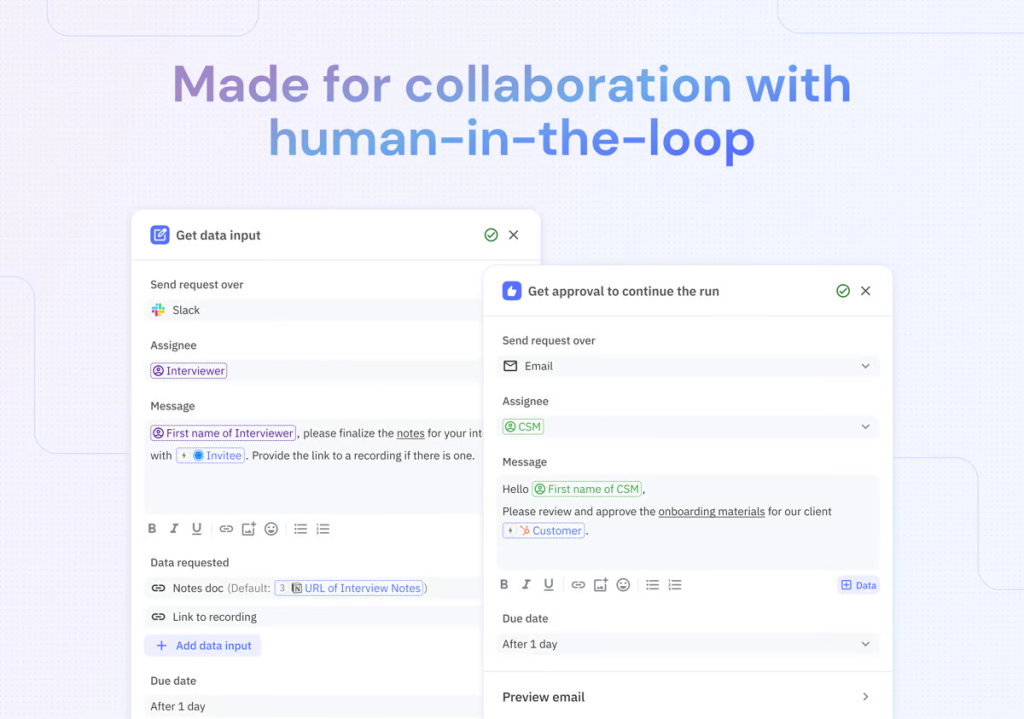
Relay is an AI-native platform that brings LLM-powered actions directly into workflow automation. Designed for fast-moving teams in marketing, customer experience, and content ops, Relay enables users to build intelligent workflows where each step can include summarization, content generation, or classification using OpenAI or Claude.
Relay’s agents can retain context between steps, enabling smarter decision-making and task flow adaptation. Teams can automate email responses, content feedback loops, or customer updates – all in real-time. The platform’s clean interface makes it easy for non-technical users to build prompt-based workflows and iterate quickly based on results.
Advantages:
- Native support for prompt-based agents using LLMs.
- Real-time content generation, summarization, and data classification.
- Shared memory between workflow steps for better contextual accuracy.
- Easy to connect with Notion, Slack, Sheets, and other daily tools.
- Ideal for marketing ops, content feedback loops, and support workflows.
3. Levity (Best for AI Automation on Unstructured Data)
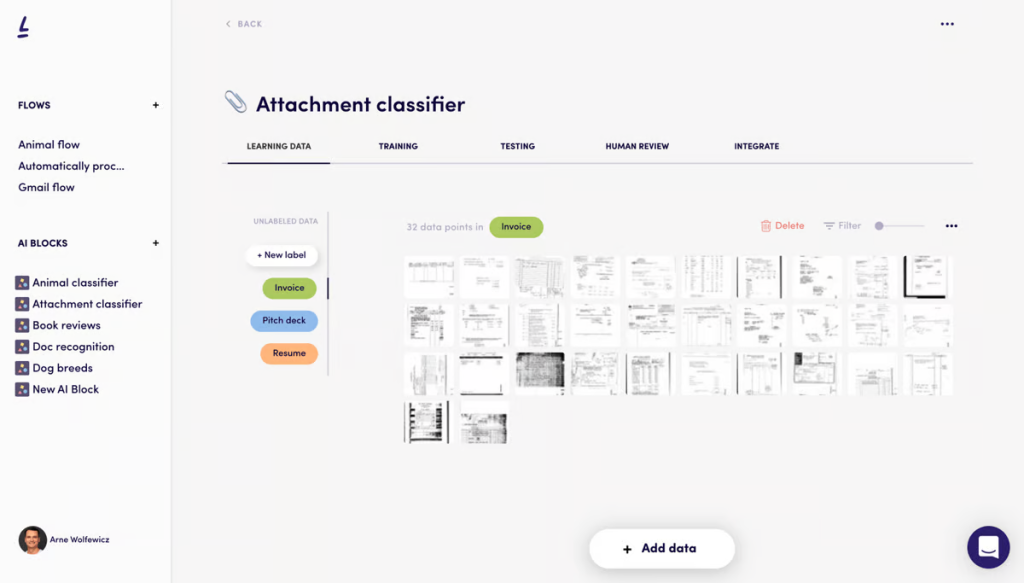
Levity is a no-code AI platform focused on automating decisions around unstructured content – such as emails, PDFs, forms, and images. With Levity, users can train AI models (agents) to classify, tag, or prioritize items based on confidence scores and routing rules. It’s a strong fit for operations teams that frequently process large amounts of incoming data.
Workflows in Levity are built around custom AI models, allowing non-technical users to automate decisions like “which emails are leads,” “which invoices are missing data,” or “which customer messages need escalation.” The platform handles repetitive review work that typically requires human judgment.
Advantages:
- No-code AI agent creation via model training.
- Automates tagging, triaging, and classification of unstructured inputs.
- Smart confidence routing based on AI model outputs.
- Connects with email, Slack, Airtable, Google tools, and CRMs.
- Ideal for support, admin, and back-office workflow automation.
4. Relevance AI (Best for Modular AI Workflows and Internal Insights)
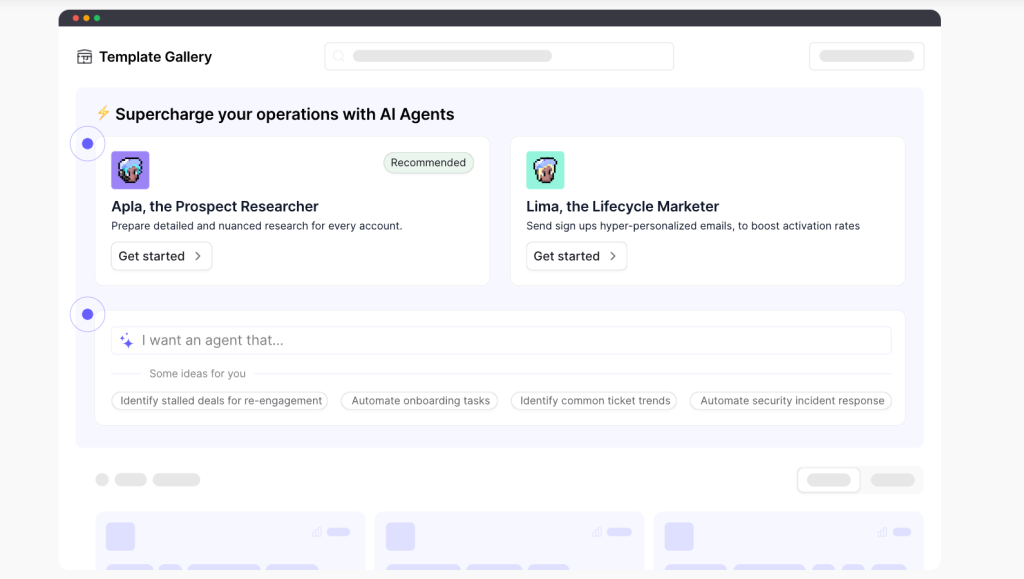
Relevance AI allows teams to create modular AI workflows powered by a combination of retrieval, generation, classification, and embedding-based logic. These workflows (or agents) can process large data sets, create internal dashboards, or build intelligent decision trees across business systems.
Teams can use Relevance to create agents that answer questions from internal databases, summarize large datasets, or classify incoming data streams – all through a drag-and-drop AI pipeline builder. It’s especially useful for insights, data ops, and product teams that need to interpret or act on large volumes of information.
Advantages:
- Modular agent design combining AI, RAG, and logic.
- Retrieval-based agents for Q&A, summarization, and classification.
- Visualization and dashboarding tools for internal analysis.
- Custom embedding pipelines for internal document understanding.
- Great for internal research, knowledge automation, and product ops.
5. CrewAI (Best for Multi-Agent Collaboration and Role-Based AI Systems)
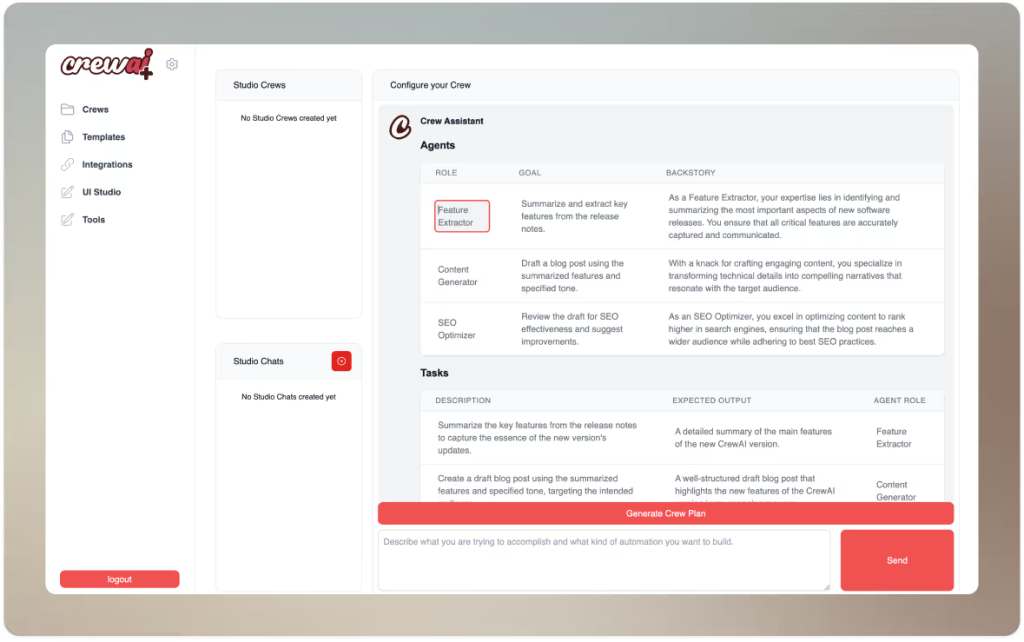
CrewAI is a framework for orchestrating multiple AI agents that can collaborate on tasks. Each agent can have a defined role (researcher, writer, reviewer), memory, and access to external tools. This allows teams to build complex, multi-step workflows where different agents work together to complete a shared objective.
CrewAI is especially suited for technical teams and advanced users who want to experiment with autonomous workflows, distributed task ownership, or agent-to-agent communication. While more developer-centric, it reflects the future of agent-based systems in collaborative environments.
Advantages:
- Multi-agent orchestration with defined roles and responsibilities.
- Agent memory and tool access for realistic collaboration.
- Ideal for simulations, internal R&D, and agent chaining.
- Open-source and flexible for building custom logic.
- Pairs well with LangChain, LLM APIs, and vector DB.
🚀 Another example of AI that transforms how businesses work:
Conclusion: Smarter Workflow Management Starts with the Right AI Agent Platform
AI Agent Platforms are changing how teams manage workflows – replacing rigid task automations with intelligent agents that can adapt, analyze, and make decisions in real time. In this article, we explored five platforms built specifically for smarter, AI-driven coordination across teams and tools.
From FuseBase to CrewAI, each solution brings unique strengths: Relay excels at real-time content workflows, Levity handles unstructured data with precision, Relevance AI delivers modular insights, and CrewAI introduces multi-agent collaboration. But among them, FuseBase stands out as the most complete platform, combining powerful AI agents, workflow automation, document intelligence, and client-facing features in one seamless system. If you’re looking to scale your operations with intelligent processes and streamlined collaboration, FuseBase is the best choice for smarter workflow management.
